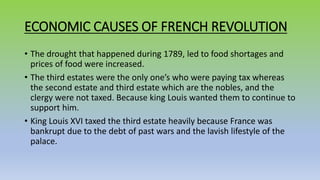The french revolution
- 2. CONTENTS âĒ King Louis XVI âĒ Three Estates: first, second and third estate. âĒ Social, Political and Economic causes of French revolution âĒ The storming of the Bastille
- 3. King Louis XVI ï§ He was the ruler of France. During his time, he ruled by an absolute monarchy. ï§ The term âabsolute monarchyâ refers to the rule of a king or queen who succeeds to the throne and has absolute power. ï§ He ignored the advice of his finance advisor called Necker that the first and second estate should pay tax and ended up firing him. ï§ Louis and Marie, his wife were spending a lot on their own personal luxuries, which was bad enough in itself, but also looked bad to others. Marie actually had no real concept of the value of money. ï§ King Louis XVI was spending a lot on wars, including helping out those nice American revolutionaries. Louisâs lavishness built up debt. The State was nearly bankrupt, the country was very well off. âĒ By 1789, France was faced by major financial and economic difficulties, resulting in widespread social unrest.
- 4. FRANCE HAD THREE ESTATES
- 5. THREE ESTATES OF FRANCE âĒ First estate- Clergy âĒ Second estate- Nobles âĒ Third estate â ordinary people/ peasants - It was divided into three different groups: 1. The bourgeoisie, were usually merchants and artisans. 2. The city workers, were poor wage-earners. 3. The peasants, they were poor farmers.
- 6. THE FIRST AND SECOND ESTATES âĒ These estates were both considered as privileged classes. âĒ They made up only 3% of the total population. âĒ They owned most of the land. âĒ They were not paying taxes. âĒ The nobles used their influence to evade taxes. Nobles collected feudal manorial dues from peasantry, also known as estate income âĒ They held the best positions in government and in the military. âĒ They received special treatment in the eyes of the law.
- 7. THE THIRD ESTATE & SOCIAL CAUSES OF THE FRENCH REVOLUTION âĒ They made 97% of the population. âĒ The bourgeoise could be wealthy, but they had to pay taxes and lacked the privileges enjoyed by the nobles. They were interested in enlightenment. âĒ The peasants were heavily taxed, because 80% of their income was taken from them yet they are the poorest in the country. So basically, the first and the second estate were exploiting the peasants who already earned little wages. âĒ Peasants were hungry and oppressed. âĒ Peasants were not allowed to hunt on the farm. âĒ Peasants were forced to do military service. âĒ The factory workers were mistreated, and they were poor, living in poor conditions in towns.
- 8. POLITICAL CAUSES OF FRENCH REVOLUTION âĒ In France, absolute monarchy was ruled according to "Divine Right. The âbelief that the king was God's representative on earth, thus they could do no wrongâ. âĒ People had no voice to challenge what the king says. They had to agree to everything he says and do it because they saw him as Godâs representative. âĒ The king selected ministers on basis of birth and favouritism. âĒ People were taken to jail without being charged and trial.
- 9. ECONOMIC CAUSES OF FRENCH REVOLUTION âĒ The drought that happened during 1789, led to food shortages and prices of food were increased. âĒ The third estates were the only oneâs who were paying tax whereas the second estate and third estate which are the nobles, and the clergy were not taxed. Because king Louis wanted them to continue to support him. âĒ King Louis XVI taxed the third estate heavily because France was bankrupt due to the debt of past wars and the lavish lifestyle of the palace.
- 10. CONTINUATIONâĶ âĒ After the economic crises surfaced in France, the peasants were heavily taxed, and this made the peasants angry because they realized that the second and the first estate are continuing to oppress them. âĒ Their anger was a root cause of the French revolution and as a result, the peasants used the ideas of philosophers to their advantage so that they can be free. âĒ Since King Louis XVI had fired Necker when he suggested that the nobles and clergy should pay tax, the peasants felt that their cries were not being heard. âĒ As a result, they burned the Bastille. This action that the peasants took made a huge difference to the rest of the world. âĒ The clergy and nobles then started to pay tax, and everyone was therefore, taxed equally. In this way, people started being ALL equal before the law. This led to the establishment of the rights of people that still exist even today.
- 11. THE STORMING OF THE BASTILLE
- 12. CONTINUATIONâĶ âĒ On the 14 of July 1789, the Bastille prison was stormed. As a sign of protest against the policies that were made by king Louis XVI. âĒ Bastille was hated by all French people as it symbolised the dominating power of the king. âĒ Today, the 14 July is celebrated as a public holiday in France. To commemorate those who fought for their rights.
- 13. REFERENCE LIST Ewert, D. (2008). Revolution Threatens the French king. Available from šÝšÝßĢShare at /dewert/231-revolution-threatens-the- french-king Ewert, D. (2008). France ultimate monarch. Available from šÝšÝßĢShare at /dewert/212-frances-ultimate-monarch Keith, C. (2009). Stages of the French revolution. Available from šÝšÝßĢShare at /carson912/french-revolution2 MeenakshiSarkar4. (2021). The French revolution. Available at šÝšÝßĢShare /MeenakshiSarkar4/electoral-politics-241293957 Philips, D. W. (2017). The French revolution. Available from šÝšÝßĢShare at /davidwilliamphillips/french-revolution-68428019 Richey, T. ( 2013). The French revolution: Part I. Available from šÝšÝßĢShare at /tomrichey/the-french-revolution-of-1789- 59198741 Hogan, W. ( 2016). The French revolution. Available from šÝšÝßĢShare at /williamhogan52/french-revolution-57626033
- 14. THANK YOU!
Editor's Notes
- #5: The picture on the right-hand side shows the third estates carrying both the first and the second estate.














